Despite a severe spike in unemployment and some project delays amid the COVID-19 pandemic, industry stakeholders remain upbeat about the long-term prospects of renewable energy, as indicated by a panel during the National Association of Regulatory Utility Commissioners’ Summer Policy Summit on Tuesday.
Gregory Wetstone, CEO of the American Council on Renewable Energy, opened the panel with some sobering unemployment figures: 514,200 people in the clean energy sector are out of work as of this month. But most of this is on the residential solar side.
“The bigger issues from the standpoint of utility-scale have been availability of tax equity and finance,” Wetstone said, though these have been mitigated somewhat by the U.S. Treasury Department’s deadline extensions in May for projects to qualify for federal tax credits.
There’s also been “a big uptick in a focus on sustainability investing,” which has been helpful, Wetstone said. He noted BloombergNEF data suggesting that though 2020 will not see as much renewable development as expected before the pandemic hit, it will still be mostly on par with that of 2019 and more than rebound next year. (See Renewable Investors See Light at End of COVID Tunnel.)
Wetstone cited “key drivers” for continued investor confidence, including decreasing costs; increased demand from residents, companies and utilities; increasing state and local renewable and emission goals; and climate change as an ever more resonant political priority for residents.
Xcel Energy CEO Ben Fowke, who serves as chairman of Edison Electric Institute, also expressed confidence. “I happen to be of the mindset that we can do more with clean energy to jumpstart the economy and overcome some of the economic impacts of COVID-19,” he said.
“We have seen some delays with some of our wind farms [because of] the supply chain disruption. Fortunately, we still qualify for the 100% production tax credits for our customers because of the safe harbor extension. … So things are going OK at Xcel, and we’re looking forward to being able to be part of the solution to get the economy rolling again.”
Fowke’s company, which has set a goal to be 100% carbon-free by 2050, expects 80% of its power to come from renewables. He is not so concerned about reaching that renewable milestone as in securing the last 20% of zero-carbon resources — the unknown on which he urged investors to focus.
“I think it’s really important we get started today in nurturing those resources so we can all meet those zero-carbon goals by midcentury,” Fowke said. “I don’t know what those resources will be.” He listed advanced nuclear, carbon capture, geothermal and hydrogen as candidates. “The important thing is we need to get started today. And we need to recognize the fact that we can’t do it with 100% renewables. It defies the laws of the grid.”
Federal Aid Unlikely
The discussion occurred amid a surge in coronavirus cases in the U.S., an increase in deaths from the virus and an uptick in unemployment claims, just as federal unemployment benefits and eviction moratorium are about to expire. Congress and the White House are in the middle of negotiations on what to do next to address the crisis.
Both Fowke and Wetstone expressed a desire for aid to the renewable sector in the form of tax credit extensions or refunds, or a measure to make it easier to site interregional transmission.
But in comments before the panel, Sen. Lisa Murkowski (R-Alaska), chair of the Senate Energy and Natural Resources Committee, said energy-specific measures are likely going to be left out of any forthcoming stimulus legislation. She listed some measures she said there has been discussion on: extension of the tax credits; a short-term waiver of Nuclear Regulatory Commission fees for “challenged” nuclear plants; and a program to provide personal protective equipment for nonprofit utilities.
“I am hoping we can find common ground in some of these areas,” she said. “Now I can’t tell you which of these items will make it into a final package; only that, in my view, they make good sense and I think that they would enhance it.”
Murkowski also used her time to plug her American Energy Innovation Act, which faltered on the floor of the Senate in March. “If anybody has an opportunity to raise these issues with the folks on the [Environment and Public Works] Committee to separate [hydrofluorocarbons] from our energy bill, I’d appreciate it,” she said. (See FERC Targeted in Energy Bill Amendments.)








